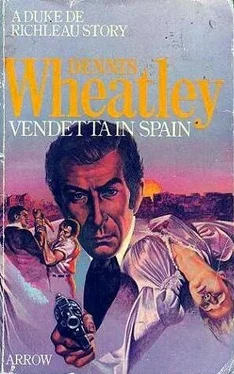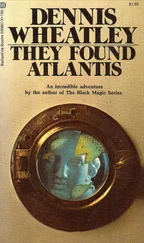then the party broke up. But before they parted Ferrer asked de Quesnoy if he would like to see over his school and, on the Count's accepting, he said:
'Unlike ordinary schools we have sessions all the year round; so although next week we shall be in August I shall still be as busy as ever. We have evening classes, too, for those who have to earn their living in the daytime; but none on Sundays because the law still kept in force through the influence of the Church does not permit it. So the best time for you to come would be on Sunday morning. Shall we say at about eleven?'
'That would suit me admirably,' the Count replied; and as he strolled back down the colourful ever-crowded Ramblas to his dreary little pension he felt well satisfied with the course events were taking.
On the Sunday he found the Escuela Moderna to be housed in an old mansion in a street just off the Ronda de Antonio, which was not far from the University; and he guessed that Ferrer had chosen its location so that it should be handy for University students with Leftish leanings who elected to take some of his courses in addition to their official curriculum.
He was admitted by an elderly janitor who took him up to the top floor of the house which, when it had been converted, Ferrer had turned into his own living quarters. Ferrer took him to his study, a room lined with bookshelves on which, as de Quesnoy saw at a glance, in addition to books in several languages, there were many hundreds of pamphlets. They had only just sat down when the door opened again and a buxom young woman carrying a tray with glasses and sherry came in. She had fine eyes and a full, moist mouth, but over wide nostrils in a retrousse nose and a very fleshy jowl robbed her of any claim to be a real beauty.
Ferrer introduced her as his wife, and as de Quesnoy bowed he studied her with interest. He knew that she had no legal claim to that status and wondered if she was Soledad Villafranca, who had also been Morral's mistress, or if she was a new acquisition in Ferrer's long line of conquests. That such an unprepossessing man should possess the power to attract a succession of women appeared strange; but the Count knew that a man's features played only a minor part in stimulating female inclinations, and that whatever the major quality was to have for his bedfellow this passionate-looking young creature, who must be at least twenty years younger than himself, Ferrer must have it.
He treated her, too, more like a servant than a wife; for as soon as she had filled their sherry glasses, although she showed an inclination to linger and join in their conversation, he as good as ordered her out of the room.
Having offered his guest a cheroot he sat back in his chair and launched out into an enthusiastic description of his school. Latin and Greek he declared to be a waste of time, and acquiring an extensive knowledge of literature and art a luxury which could be afforded only if one intended to take them up as a means of livelihood or make them one's chosen recreation. Grammar and syntax he also declared to be unnecessary, except for a would-be writer, as all that the average man needed was the ability to make himself understood with reasonable clarity. Naturally, everyone should have a basic knowledge of most subjects taken in a normal education, but the really important thing was that both men and women should concentrate from their 'teens onward on some course of study which would enable them to become useful members of society.
He had as pupils boys, girls and also grown-up men and women. When they came to him they had to select one, or at most two, fields suited to their abilities in which to specialize. All had to go through the three courses in history that he had outlined to de Quesnoy at their earlier meeting, in order that they might fully understand the development of mankind, their obligations to their fellow-men, and become workers in the international movement to free the masses from their centuries-old slavery. But apart from this sociological instruction all their other time was given to developing their natural talents. There was a section in which pupils could graduate through carpentry, plumbing and practical building to architecture, another in which they could graduate through typing and shorthand to secretarial duties or journalism, and sections teaching cooking and household management, engineering and technology, chemistry and science, and agriculture. In addition, extra courses could be taken in French and German and in literature and art.
Now that the matter was put to him de Quesnoy was inclined to agree that in normal schools much time was wasted drilling into pupils matter that could be of little value to them later in life, and that for men and women who would have to earn their own living this new system of education, in which they devoted their energies to acquiring practical knowledge in specialized fields while still young, had much to commend it. But one thing stood out a mile. The heart and soul of Senor Francisco Ferrer's Escuela Moderna lay in the course which all pupils were compelled to take, whereby he disseminated his doctrines for the abolition of the Church and State and the emergence of a classless society.
In the Count's mind there lay no shadow of doubt that Ferrer's school was the root from which the Spanish anarchist movement was fostered and supplied every year with scores of young enthusiastic recruits. It now remained to discover whether he was content only to spread his mental poison, or if he actually encouraged the more fanatical of his disciples to undertake Propaganda by Deed.
Far from disclosing even a suggestion of his thoughts, de Quesnoy expressed the greatest interest in Ferrer's work and gave it the highest praise. When they had finished their drinks the schoolmaster stood up and proposed to show his guest over the premises. Following him downstairs de Quesnoy duly inspected the rows of typewriters in one room, the long carpenter's bench in another, the drawing-boards of the technicians in a third, and so on, until they came to a laboratory. In it two youngish men stood side by side bending over one of the slabs, their backs turned to the door. At the noise of the door opening they both swung round and, after a moment's hesitation, Ferrer introduced them:
'My two sons, Benigno and Sanchez; Senor Chirikov, who has recently arrived from Russia.'
If appearances went for anything the brothers had had different mothers. Benigno was small, sandy-haired, intelligent-looking and had both his father's high forehead and sharp nose. He gave the impression of being about twenty-six. Sanchez was a big man, dark to the point of swarthiness, with the coarse features of a peasant and narrow eyes that suggested he had inherited a peasant's cunning. De Quesnoy put him down as about twenty-one.
As the Count walked forward to shake hands with them his glance took in the slab at which they had been working. On it there was a metal canister, the works from the inside of a small clock, some slabs of stuff that looked like toffee, and several strands of thin wire. Having been a soldier he immediately recognized the slabs as dynamite and realized that the brothers had been constructing an infernal machine.
Ferrer, too, had immediately grasped the situation. His face suddenly dark with anger, he snapped at his sons, 'I have told you before. I will not allow you to construct such things here. The . . . the workshop at the mine in which they are used is the place for that.'
De Quesnoy could not tell if Ferrer's anger was real. If it was it lent support to the police reports about him, which stated that, although he openly preached the doctrines of anarchy, he was opposed to violence and had no connection with the militant anarchists. On the other hand it might be simulated and the implication that the explosives were to be put to a legitimate use in a mine a clumsy attempt to cover up the use his sons were making of the laboratory.
Читать дальше












